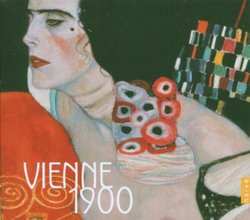| All Artists: Richard [1] Strauss, Anton Webern, Johannes Brahms, Arnold Schoenberg, Gustav Mahler, Johann II [Junior] Strauss, Alexander von Zemlinsky, Alban Berg, Franz Schreker, Alain Lombard, Bernard Haitink, Armin Jordan, Amaury Du Closel, Quatuor Arditte, Arditti String Quartet, Versailles Camerata, Quatuor Danois, Anna Holroyd, Bordeaux Aquitaine National Orchestra, Orchestre National de France Title: Vienne 1900 Members Wishing: 2 Total Copies: 0 Label: Valois Original Release Date: 1/1/2006 Re-Release Date: 1/17/2006 Genre: Classical Styles: Opera & Classical Vocal, Ballets & Dances, Waltzes, Chamber Music, Forms & Genres, Ballads, Symphonies, Theatrical, Incidental & Program Music, Instruments, Strings, Symphonies Number of Discs: 3 SwapaCD Credits: 3 UPC: 822186050392 |
Search - Richard [1] Strauss, Anton Webern, Johannes Brahms :: Vienne 1900
 | Richard [1] Strauss, Anton Webern, Johannes Brahms Vienne 1900 Genre: Classical
|
Larger Image |
CD Details |
CD ReviewsA 2-CD Sampler with a Difference J Scott Morrison | Middlebury VT, USA | 01/29/2006 (4 out of 5 stars) "Whoever had the idea for this budget-priced sampler of music from Naïve's associated label, Auvidis, should be congratulated for a smart idea. The notion here is to include clips of music composed in and around Vienna in a period ten years or so on either side of the year 1900. At that time Vienna was a hotbed of musical innovation and probably the most exciting musical city in the world. It was also in literary and visual artistic ferment as well. The Romantic era was coming to an end and there were post-Romantic composers all over the place, and then Schoenberg and his followers pushed the boundaries a bit further, going beyond chromaticism and developing what became the Second Viennese School known for its dodecaphonic and atonal approaches. Part of what makes this sample interesting is the juxtaposition of more or less contemporary works that look back to Wagner and beyond, and those that look forward to the twentieth century's innovations. Also interesting is that most of the musicians featured here are not Austrian or German by and large; most of them are French or English. The Arditti Quartet, possibly the world's greatest exponents of modern quartet music, is featured as they are, I believe, exclusive Auvidis/Naïve artists.
At the time of this review Amazon has not listed the set's contents precisely and I shall do so here, in the order in which they appear on the 2 CDs: CD1: 1. Richard Strauss: opening measures of 'Also Sprach Zarathustra' 2. Anton Webern: Langsamer Satz (1905) 3. Brahms: Intermezzo, Op. 117; Ballade Op. 118, No. 3 Allegro barbaro 4. Schoenberg: Verklärte Nacht: Sehr ruhig (4 minute excerpt) 5. Mahler: Symphony No. 5: Adagietto; Symphony No. 6: Scherzo 6. Johann Strauss: Rosen aus dem Süden (arr. for string quartet, harmonium, and piano by Schoenberg) 7. Alexander von Zemlinsky: Overture to 'A Florentine Tragedy' 8. Alban Berg: Quartet Op. 3 (1910) 9. Mahler: Ich bin der Welt abhanden gekommen, arr. for a cappella chorus by Clytus Gottwald CD2: 1. Schoenberg: Quartet in D Major (1897) 2. R. Strauss: Till Eulenspiegel (1895) 3. Webern: Five Movements for String Quartet, Op. 5 (1909) 4. Franz Schreker: Two Songs for Deep Voice (1909) 5. Schoenberg: Second String Quartet, Op. 10 (1907): Litanei 6. R. Strauss: Cello Sonata, Op. 6 (1883) Andante con moto 7. Brahms: String Quintet, Op. 111 (1890), Adagio 8. Mahler: 'Die zwei blauen Augen' from Lieder eines fahrenden Gesellen (arr. Schoenberg) 9. Berg: Five Variations on a Theme of Schumann (1906-7); Theme and Five Variations for Violin and Piano (1906-7) Artists include the Arditti Quartet in all the chamber works requiring strings; Dawn Upshaw in 'Litanei'; Pierre-Laurent Aimard (with cellist Anne Gastinel) in the Strauss cello sonata; Armin Jordan conducting the ORTF in the Zemlinsky; Alain Lombard conducting the Orchestra of Bordeaux-Aquitaine in the opening of 'Also Sprach Zarathustra'; Andrea Bonatta, piano, in the late Brahms works; Bernard Haitink conducting the Orchestre National de France in the two Mahler symphony movements; and Accentus Chamber Choir in the Mahler arrangement of 'Ich bin der Welt abhanden gekommen; and more. Frankly, none of orchestral performances is world-shattering. The Ardittis, on the other hand, are definitive in their contributions. The choral arrangement is sung gloriously by Accentus, but the arrangement itself leave much to be desired -- although maybe it's just that I don't like 'Ich bin der Welt abhanden gekommen' in anything but its original form. The Schoenberg chamber reductions, made for the now-famous Society for Private Musical Performances, are very interesting to hear and well done. I see this sampler as being an easy way from someone feeling their way into that world of fin de siècle Vienna to get a notion of what was going on musically then and there, along with the Vienna 'Sezession' movement and the Jugendstil, Freud's pathbreaking work and so on. The booklet notes by Jean-Charles Hoffelé are fascinating, although the English translation has more than its share of typos. The booklet cover is a gorgeous reproduction of Gustav Klimt's 1909 masterpiece 'Salome or Judith II'. Scott Morrison" |

 Track Listings (11) - Disc #1
Track Listings (11) - Disc #1